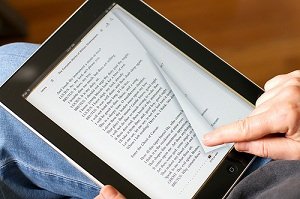The onset of information technologies in the last several decades considerably changed and continues to change our everyday lives, our habits, our economy. New industries appear, old ones disappear or change beyond recognition, and one of the industries that simply cannot ignore the technological progress is, of course, book production.
E-Books vs. Printed Paper
 A lot of people believe that printed books will turn into an anachronism in a matter of years – e-books are just too convenient. In order for a printed book to reach its final user one has to create its layout, get a printing press, procure expendable materials, print it, bind it, put it into a cover and physically transport to every single person that is going to use it. While in case of an e-book one has to prepare it once for every separate format, after which the final user will be capable to download it and use it with his or her reading device. No need to line your walls with bookshelves that gather dust and smell of mold. No need to carry a bagful of books with you if you want to read during a long journey. If you have your reading device with you, you can have any number of books you need or like at any given moment.
A lot of people believe that printed books will turn into an anachronism in a matter of years – e-books are just too convenient. In order for a printed book to reach its final user one has to create its layout, get a printing press, procure expendable materials, print it, bind it, put it into a cover and physically transport to every single person that is going to use it. While in case of an e-book one has to prepare it once for every separate format, after which the final user will be capable to download it and use it with his or her reading device. No need to line your walls with bookshelves that gather dust and smell of mold. No need to carry a bagful of books with you if you want to read during a long journey. If you have your reading device with you, you can have any number of books you need or like at any given moment.
But of course there are still naysayers. They base their disbelief in the possibility that e-books will ever become completely dominant on different premises. Some say that e-books just don’t have the feel of ‘real’ books and there will always be a percentage of nostalgic readers who will choose to use time-honored technology. Others think that e-books are bad for the eyes. Still others – and it is the most interesting idea of all – believe that e-books are very far from being such an ideal medium as it is often portrayed.
Technological Difficulties
In fact, some publishers find dealing with e-books even more difficult, taxing and full of setbacks than traditional printing. The problem is based on the fact that there are different devices which use different formats, and the producers of these devices are ready to go out of their way to promote their own formats and make it impossible to use on all other devices, fighting for their share of the market. There are, for example, the following formats:
- PDF document.
- EPUB format, used in most e-book hardware and software.
- MOBI, proprietary Amazon’s format which is a simplified version of EPUB.
- KF8.
- FB2.
And it is just to name a few. Remaking of a book for each and every of these formats is a long and arduous task, entailing many technological difficulties. It may turn out that it is quicker and easier to publish a book the old-fashioned way than to try and deal with all this chaos.
However, one shouldn’t forget that the art of book printing existed for centuries and was perfected by generations of experts, while e-books have been in more or less active use for several decades. They will achieve the same level of perfection – in time.